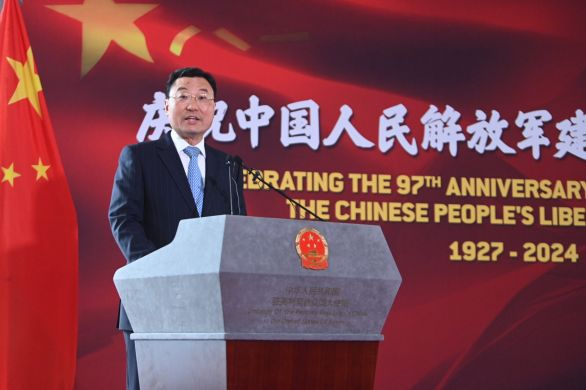Beijing's top envoy highlights need for cooperation and end to confrontation

A stable China-US relationship is indispensable for the peaceful development of the world, and it is vital to value peace and put a foundation of no conflict and no confrontation under that relationship, Beijing's top envoy in Washington has said.
"When we choose peace and solidarity, a war, either cold or hot, will not break out. And when we choose openness and cooperation, global development and prosperity will have greater hope," Ambassador Xie Feng said on Thursday.
The envoy made the remarks at a reception at the Chinese Embassy in the US to celebrate the 97th anniversary of the founding of the People's Liberation Army of China.
READ MORE: Chinese envoy calls for promoting stable, sustainable Sino-US ties
The event highlighted the army's commitment to fostering cooperation and peace with the global community.
The anniversary falls on Aug 1.
In his remarks, Xie noted that next year marks the 80th anniversary of the victory in the World Anti-Fascist War and the founding of the United Nations, of whose Security Council the two largest economies are permanent members.
"Major-country conflict and confrontation is not a distant memory and the original aspiration of the UN to save succeeding generations from the scourge of war must not be forgotten," Xie said. "Major countries shoulder critical responsibilities for global strategic stability."
Differences between China and the United States are no cause for alarm. What is vital is that they should not let differences define the bilateral relationship, nor should they amplify differences or intentionally create new ones.
"We need to responsibly manage differences and handle any accident in a prudent way, so as to maintain the overall stability of the relationship," Xie said.
He said China does not bet against the United States and will not interfere in US domestic affairs, including its elections.
"Likewise, the US side should not suppress China's development, interfere in China's domestic affairs, or exploit China-US relations in this election year," he said.
He further noted that it is also important to uphold credibility and step up exchanges and cooperation.
"China and the United States need to honor their commitments to each other with action, faithfully implement the two leaders' common understandings, strengthen dialogue in a mutually respectful way and advance cooperation in the spirit of mutual benefit, to turn the San Francisco vision into reality," he said.
The future-oriented vision was outlined by the two leaders during their summit meeting in San Francisco last November.
"It is hoped that the US side will work with China in the same direction, to stabilize and improve the bilateral relationship in the principles of mutual respect, peaceful coexistence and win-win cooperation, with a sense of responsibility for the people, for the world and the future," Xie said.
'Moving forward'
Fern Sumpter Winbush, the US Principal Deputy Director for the Defense POW/MIA Accounting Agency, said it was "heartwarming "to hear the ambassador talk about peace and tranquility and cooperation between the two nations.
"We have our challenges, we have our history. But we (are) really focused on the future and moving forward together in a cooperative way," Winbush told China Daily.
"I think the more that our leaders talk face to face, the more they have an understanding that peace is more important than war," she said.
ALSO READ: Exchanges to help bolster China-US ties
Winbush's remarks were echoed by Sherwood (Woody) Goldberg, a retired US Army Officer. "We need to tie China and the United States together politically, economically, socially, trade-wise, and military, so we do not have a Cold War," said Goldberg, now the senior adviser to the Foreign Policy Research Institute Program on National Security and associate professor at US Military Academy, West Point.
He said that people in both countries and the world want peace, stability and prosperity; and that more military talks are needed, as well as people-to-people relationships through cultural exchanges. "Certainly, no one is a winner when there's a conflict," he added.
Thursday's reception was attended by more than 300 guests, including US government and military officials, diplomats and military attaches of other countries, and representatives of overseas Chinese communities and Chinese institutions in the US.


